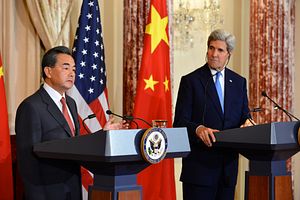Chinese Foreign Minister Wang Yi arrived in Washington DC yesterday for talks with U.S. officials. Wang’s current trip also included attending the U.N. General Assembly in New York (where he and India’s foreign minister negotiated an end to their countries’ border stand-off) and a visit to Mexico.
Wang’s visit to the U.S. is primarily aimed at advancing plans for U.S. President Barack Obama’s visit to China in November. Obama will attend the APEC leader’s meeting in Beijing and will also hold bilateral talks with Chinese President Xi Jinping. U.S. National Security Advisor Susan Rice headed to Beijing last month to discuss plans for November; now it’s Wang’s turn.
During his time in D.C., Wang met with U.S. Secretary of State John Kerry, Defense Secretary Chuck Hagel, and NSA Susan Rice. In addition, Wang held meetings with former U.S. government officials, including former Obama NSA Tom Donilon (who also served as the administration’s point person on China) and Zbigniew Brzezinski, NSA under President Jimmy Carter. According to Xinhua, Wang stressed the importance of a smooth Obama-Xi meeting in his talk with Donilon. “China and the United States need to make good preparations for the visit to China by U.S. President Barack Obama in November, in order to gain more tangible results in pushing forward the construction of a new model of bilateral ties,” Xinhua paraphrased Wang as saying.
But Obama’s upcoming visit to China wasn’t the only topic under discussion. U.S. State Department spokesperson Jen Psaki told reporters on Tuesday that the situation in Hong Kong “is obviously a prominent issue in the news, one the Secretary is well aware of, and I expect it will be a part of this discussion [with Wang].” Previously, Psaki stated the U.S. position on the protests: “We’ve urged and we continue to urge Hong Kong authorities to exercise restraint and for protestors to express their views peacefully. We, as you know, support universal suffrage in Hong Kong in accordance with the Basic Law and we support the aspirations of the Hong Kong people.” Kerry made similar comments in a press conference just prior to his meeting with Wang.
This isn’t a conversation Wang was eager to have. For one thing, China’s Foreign Ministry calls the current protests “illegal” and has urged other countries not to support the movement. However, on a deeper level, China does not want other countries commenting on the protests or otherwise “interfering in in Hong Kong’s internal affairs.” Wang repeated this stance in the press conference with Kerry.
Psaki also indicated that Kerry and Wang would likely discuss the international response to Islamic State in their meeting. In response to a question about U.S.-China discussions over potential “military actions from the Chinese side,” Psaki said, “I’m sure that will be part of the discussion there if there’s time.” China’s role in the fight against IS was also under discussion during Rice’s visit to Beijing in early September.
China has indicated its willingness to support the fight against terror in a general sense but prefer to limit its role to offering humanitarian aid and helping to train counterterrorism forces in affected countries (such as Iraq). On Wednesday, Wang met with U.S. Defense Secretary Chuck Hagel, where cooperation against IS was also a topic of discussion.

































